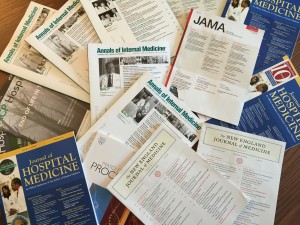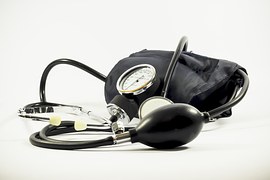Reading this stuff . . . so you don’t have to.
One goal of mine for this blog is to connect people to medical science. But ask any doctor – staying current on the latest in medical evidence is not easy. Look at this picture – it could be the nightstand of many a doctor. It is actually the table in my office after I simply grabbed a few recent journals from my shelf. Seriously. Glamorous it may not be, but it is oh, so important. By staying abreast of latest medical science, we can give you the best advice possible.
So every now and then I’m going to do a p ost highlighting a “Pearl from Medical Science” in which I will summarize one item from the medical literature – a pearl, if you will. Basically reading this stuff so you don’t have to. I’ll try to distill the medical jargon and heady science into something meaningful – something you can act on in your own life.
ost highlighting a “Pearl from Medical Science” in which I will summarize one item from the medical literature – a pearl, if you will. Basically reading this stuff so you don’t have to. I’ll try to distill the medical jargon and heady science into something meaningful – something you can act on in your own life.
So here goes this first pearl, which is taken from the Annals of Internal Medicine from November 2015.
PEARL: Get your blood pressure checked
Sounds pretty simple, but many of us don’t do this. To make the case for why it is important, check out these facts on hypertension:
- Hypertension (or high blood pressure) affects nearly 1/3 of the adult population.
- Hypertension is the most commonly diagnosed condition in clinics.
- Hypertension is a major risk factor for developing heart disease, stroke, and kidney disease.
- Hypertension is a major contributor to death in over 350,000 people in the United States each year.
- Importantly, many people don’t know they have high blood pressure because it usually has no symptoms.
- Checking blood pressure is low-cost and just about risk-free.
- Finding and treating high blood pressure has been shown to reduce your chances of developing future complications.

WHAT SHOULD YOU DO?
The United States Preventive Services Task Force is the group of smart people who look at all the available evidence and make recommendations for your doctor, who is supposed to pass them on to you. So what are those recommendations?
It’s pretty simple, really. If you are an adult, you should be checking your blood pressure, and getting treatment if it is high. Simple as that. Specifically, the USPSTF recommends:
- Adults 18 years and older should get a screening blood pressure check in your doctor’s or practitioner’s office. It’s always best if you relax for a few minutes first, stay quiet during that time while the cuff is on your arm, and generally get into your chill, happy,
 relaxed place (cue the rainbows and butterflies). Even better if they check the blood pressure more than once over several minutes and take the average of the readings.
relaxed place (cue the rainbows and butterflies). Even better if they check the blood pressure more than once over several minutes and take the average of the readings. - If blood pressure is elevated (usually defined as >140/90), a diagnostic confirmation of elevated readings should be done on at least two separate occasions – before beginning treatment. You don’t want to commit to a long-term course of treatment based solely on the one elevated reading in the less-than-ideal setting of a doctor’s office.
- The best way to do confirmation is by ambulatory blood pressure monitoring (ABPM – medical jargon alert!), in which you continuously wear a machine at home for 12-24 hours, but that isn’t always practical, so you can also just check your blood pressure a few separate times at home. Perhaps ironically, getting it done in the clinic is not the best as people tend to be a bit “on edge” in the exam room. But get it done somewhere!
- If your initial blood pressure is normal (<130/85), then you should have it re-checked every 3-5 years until you hit age 40. After that, check it every year.
- Others who should check it every year regardless of age are those with borderline high readings (130-139/85-89), African-Americans, and overweight/obese people.
 These are not fuzzy recommendations, they are strong ones, what we call in medical terms a Grade A recommendation. This means that the experts are not just guessing here – there is strong evidence that this is the way to go. And the good news is that hypertension is treatable with a variety of treatments that are generally well-tolerated by people. Yeah, you may have to take some pills, but the payoff is huge in reducing your chances of badness in the future.
These are not fuzzy recommendations, they are strong ones, what we call in medical terms a Grade A recommendation. This means that the experts are not just guessing here – there is strong evidence that this is the way to go. And the good news is that hypertension is treatable with a variety of treatments that are generally well-tolerated by people. Yeah, you may have to take some pills, but the payoff is huge in reducing your chances of badness in the future.
Stroke? Heart disease? Kidney disease? High blood pressure is one of the leading risks for all of these.
Lower your blood pressure, lower your risk.
Do you know your blood pressure?
There you go – a simple pearl from the medical literature. And look for future Pearls from Medical Science on MyHealthyMatters.org!
